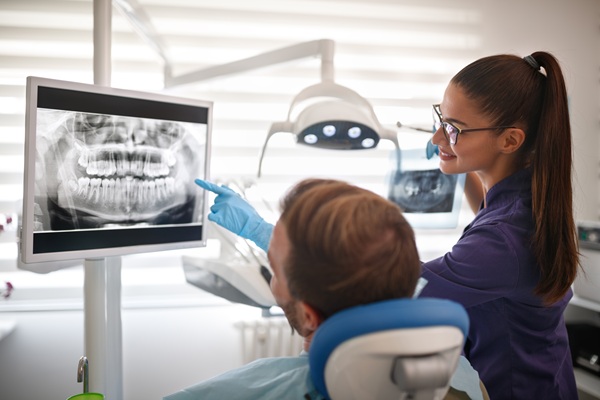When Would Oral Surgery Be Necessary?

A dentist can take many approaches to treat oral health issues. Lifestyle changes, more frequent cleanings, dental work, and medication may be used. Oral surgery may also need to be incorporated into a patient's treatment plan. Even though healthy alternatives exist that can help reduce pain and improve tooth and gum health, there are circumstances in which oral surgery is a necessity.
Common situations that require oral surgery
Some dental issues simply cannot be managed correctly or effectively without surgical treatment. While it may seem intimidating to some patients, oral surgery is relatively common and can be used to treat a wide variety of problems.
Impacted tooth extraction
Many people need to have some teeth professionally removed at some point during their lives. For most, this is a result of impacted wisdom teeth. These molars in the very back of the mouth can cause pain, alignment issues, and infections when left untreated. However, wisdom teeth are not the only teeth that can become impacted. Any baby or permanent tooth can fail to erupt above the gum line and require oral surgery for removal.
Placing dental implants
Dental implants are a popular treatment option for replacing severely damaged or missing teeth. A crown is attached to a metal rod, usually made of titanium, which must be inserted below the gum line so it can attach to the jawbone. Oral surgery is required for this type of procedure.
Cancer treatment
When dealing with oral cancer, there are several situations that may require oral surgery. Removing tumors or cysts is the most common. In severe cases, sections of hard or soft tissue may also need to be removed to stop cancerous growth.
Severe jaw problems
The temporomandibular joint disorder can cause pain, tension, and inflammation in the jaw. For some, the discomfort can be managed with lifestyle changes or medication. Severe cases may require surgery for relief.
Dental injuries or trauma
A sudden impact on the mouth can result in serious or numerous dental injuries. Sometimes, the force is great enough to break bones in addition to loosening, damaging, or knocking out teeth. Severe dental injuries may require oral surgery for a complete repair.
Bite alignment issues
Improper bite alignment can be a problem when left untreated. It can result in dental or facial pain, along with speech and digestive issues. Some bite patterns can be fixed by straightening teeth. Others, especially those caused by issues with the palate bone, may require oral surgery as well.
Sleep apnea complications
Sleep apnea is a common but serious condition that can increase the risks of heart disease, diabetes, obesity, and even early death. Some cases are treatable with devices and appliances. Others require oral surgery to remove airway obstructions.
Conclusion
Oral surgery is often the last resort when it comes to treating dental issues. Even so, it is still relatively common since it is frequently needed to prevent serious complications in the future. Talk with your dentist to determine whether this type of treatment is necessary for your own dental and overall health.
Request an appointment here: https://totalcaredentalchicago.com or call Total Care Dental at (773) 786-9586 for an appointment in our Chicago office.
Check out what others are saying about our dental services on Yelp: Oral Surgery in Chicago, IL.
Related Posts
The idea of oral surgery can be intimidating, especially when your dentist recommends it. It is easy to understand the extra layer of anxiety that happens when the dentist goes on to refer you to a specialist.As you picture an unfamiliar person coming at your mouth with sharp instruments, you ask yourself: Do you really…
Common oral surgery procedures such as tooth extraction, wisdom tooth removal, and the fitting of dental implants require you to watch what you eat and drink after the surgery — but choosing the right food and drink can be a challenging task.Since you might be temporarily incapacitated after your oral surgery procedure due to anesthesia,…
Dental implants are often used to replace individual teeth but can also offer multiple teeth replacement options. Such options include cantilever bridges, implant-supported bridges and implant-supported partials.Depending upon the condition of the person's gums and jawbone, a single implant can sometimes be placed to support two adjacent teeth. More commonly, multiple implants are used to…
Dental patients who are planning a visit to an implant dentist may be unfamiliar with the details regarding implants. It is crucial to learn as much information as possible before scheduling an appointment for this surgical procedure.A dental implant is a common permanent tooth replacement option that can be highly beneficial to a patient’s health…

